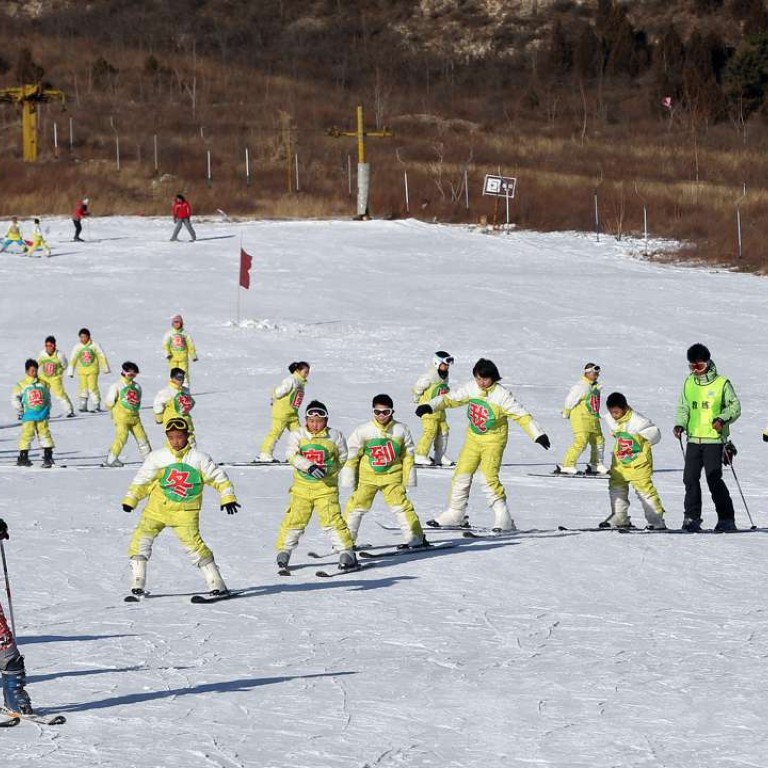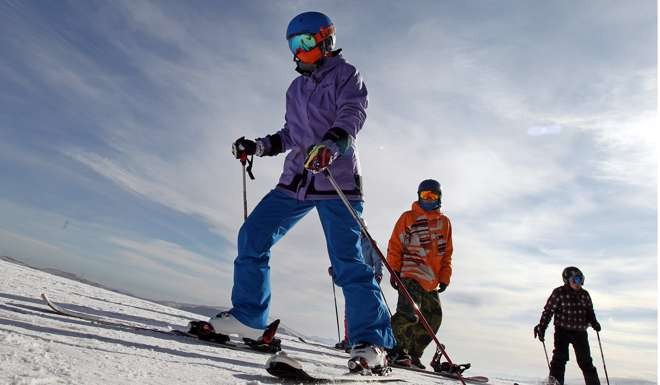
Chinese children take up snow sports in run-up to hosting 2022 Winter Olympics
Authorities expect winter sports to be worth 1 trillion yuan by 2025
Aspiring figure skater Kiki Liu takes a lamp with her when she goes to practise, so she can finish her homework at the diner next to the ice rink and eat a quick supper between her sessions on the ice.
The eight-year-old has been training on the ice in Beijing for three years. Her mother drives her to the rink after school twice a week, where she practises for at least three hours.
On the days when Kiki isn’t on the ice, she studies ballet and other forms of dance to strengthen her figure skating.
“My daughter had pneumonia several times when she was young, so I signed her up for this ice sport,” said her mother Echo Wang, a full-time housewife. “She is seldom sick now and somehow we continue with the training.”
Winter sports were rare in China even two years ago but the country’s growing middle class has been turning to snow sports that are popular in Western culture, such as skiing, figure skating and ice hockey.
Last month, the National Development and Reform Commission issued a document that estimated that by 2025 more than 300 million people would be engaged in winter sports in some way. China’s winter sports industry is expected to be worth 1 trillion yuan (HK$1.1 trillion) by 2025.
“Our survey shows that the winter sports population, or the number of people engaged in such sports, has been growing by 16 per cent in the past year and we expect the growth will be faster now that Beijing has won the rights to hold the Winter Olympics in 2022,” said Lin Xianpeng, a professor with the Beijing Sport University. “We think a 300 million winter sports population is a fair number and the key is to get more school children involved in such sports.”
Beijing’s education authority has pledged to promote winter sports among primary and middle school pupils, by ensuring they play at least one hour of winter sports each week and aiming for each pupil to master at least one winter sport.

Some primary and middle schools already offer classes in such sports and more are to come.
“We are in the middle of talks with several key schools in Xicheng district,” said Li Rongrong, branch manager of the Little Wolf Hockey Club. “Many public schools are very keen to bring winter sports to campus or to set up an ice hockey team.”
The club has been operating for a decade in Beijing, but saw its the biggest membership jump last year after Beijing won the bid to host the 2022 Winter Olympics.
Its membership numbers went from 100 to 320 within a year and the club, which used to rent an ice rink in central Beijing, moved to an area with its own rink so its members could have unlimited access.
A second rink is being renovated in the city especially for figure skating teams and a third rink is scheduled to open in west Beijing next month.
“We see ice hockey as having the biggest prospects in the national enthusiasm for winter sports,” Li said. “It used to be for the rich only but now has become more and more popular.”

Seven-year-old Michael Hou, who attends a public primary school in Dongcheng district, started playing ice hockey two years ago. His parents hoped the sport would help Michael become physically stronger, but it has also helped him develop character skills.
“Whenever someone around him got a cold, my son would catch it,” his mother Betina Xu said. “Now he seldom suffers upper respiratory tract infections.
“He is a stronger boy and has learned to fight back when others bully him.”
Michael’s mother said he has also become a team player who cheers on his fellow players for every goal, even if he has play no role in it.
Lin, of Beijing Sport University, said winter sports are also becoming popular in other parts of China, such as west of Sichuan, on the Taihang Mountains in central China and north of Qinling Mountain, .
Ice rinks are also popular in the south, even in the southern province of Guangdong, and more than 100 indoor skiing venues are being built across China, Lin said.

